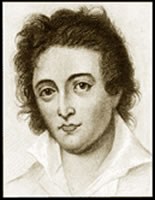![]()
Percy Bysshe Shelley
It is ironic that while Victor Hugo finds Hamlet incapable of action because
he is too much the poet, Percy Bysshe Shelley finds him to be too much the
philosopher.
|
The character of Hamlet, as I take it, represents the profound philosopher;
or, rather, the errors to which a contemplative and ideal mind is
liable... - Mary Shelley (?), "Byron and
Shelley on the Character of Hamlet" in The Romantics on Shakespeare,
Penguin, London, 1992. p.342. |
 |
While there were subtle articulations of the nature of Hamlet's internal
struggle with action, the range of positions was limited. To an outsider,
the fascination of the Romantics with these small differences amounted to
little more that the recitation of what had already become a litany of predictable
pieties about Hamlet. In her account of Shelley's discussion of Hamlet
with Lord Byron, Mary Shelley ends with a note of comment on what had
already become the banality of this line of thinking.
|
'It appears, therefore, that Hamlet is, in itself, a complete and
reasonable whole, composed in an harmonious proportion of difference
and similitude, into one expressive unity.' - Mary Shelley (?), "Byron and Shelley on the Character of Hamlet" in The Romantics on Shakespeare, Penguin, London, 1992. p.349. |